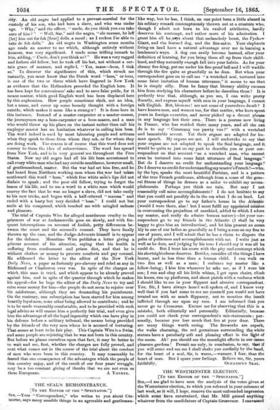like way, but he has, I think, on one point
been a little absard in his solitary remark contemptuously thrown out at a creature who, though I admit not born to his exalted attributes,' hardly deserves his contempt, and rather more of his admiration. I grant him all lur.swys about that melancholy beast, the Fychow Giant, and the learned dog, and the fire-eater. Your elephants living on land have a natural advantage over me in learning a landsman's ways. A dog can easily become learned, after your definition of learning, for you bring them all up from their child- hood, and they naturally enough fall into your habits. As for your clumsy fire-king, put me under his fire-proof bell and I will waddle through the fire quite as gracefully as he does. But when your correspondent goes on to call me " a wretched seal, tortured into some faint imitation of human utterance," it seems to me that he is simply silly. Does he fancy that literary ability excuses him from studying his characters before he describes them? It is perfectly true that, although, as you see, I can write pretty fluently, and express myself with ease in your language, I cannot talk English. But, bless me ! are not some of yourselves dumb ? I have known men, and women too, for that matter, who have spent years in foreign countries, and .never picked up a decent phrase in any language but their own.; There is a peeress now living in France, who has resided there _many years, and all she can do is to say " Commang voo' pawty voo ?" with a wretched and lamentable accent. Yet their -organs are adapted for hu- man speech. My organs are not. I will undertake to say that your organs are not adapted to speak the Seal language, and it would be quite as just on my part% to describe you or your cor- respondent on that account "as a wretched man, who cannot even be tortured into some faint utterance of Seal language." But do I deserve no credit for understanding your language ? Do I deserve no credit for understanding my master's French ?—w ho, by the bye, speaks the most beautiful Parisian, and is a pattern of the true French gentleman, although from a sense of the gene- ral fitness of things he dresses as a sailor to exhibit my accom- plishments. Perhaps you think me vain. But may I not reasonably call mine accomplishments? I do not hesitate to say that you could not possibly do in the sea what I do on land. Let your correspondent go to my father's house in the Atlantic (would I were there, alas ! but I must fulfil my appointed mission in overcoming the prejudices of mankind, added to which I adore my master, and really do admire human nature)—let your cor- respondent go to my friends in the Atlantic (I shall be very happy to give him an introduction), and let him present an ocean lily to one of our ladies as gracefully as I bring a rose on my fins to one of yours, and I will admit that he has a claim to dispute the palm of politeness and accomplishments with me. I write just as well as he does, and judging by his tone I should say it was all he could do. But I treat his scorn with the pity and contempt which his shortsightedness deserves. Besides, consider all the things I have learnt, and in less time than a human child. I can walk on two fins as well as a man; I embrace my master like a fellow-being; I kiss him whenever he asks me, as if I were his son; I run and obey all his little whims, I get upon chairs, climb his knees, run up platforms, and shoot pistols with a coolness which I should like to see in your flippant and abusive correspondent. You, Sir, I have always heard well spoken of, and I know very well that if you had come to see me yourself you would not have treated me with so much flippancy, not to mention the insult inflicted through me upon my race. 1 am informed that you never go to Cremorne. Excuse me for observing that this is a mistake, both editorially and personally. Editorially, because you could not check your correspondent's mis-statements ; per- sonally, because you lose much that lies at your door. There are many things worth seeing. The fireworks are superb, the walks charming, the red geraniums surrounding the white statues have a peculiarly soft and pleasing effect in the litht of the moon. Ah ! you should see the moonlight effects in our ocean pleasure gardens ! Permit me only, in conclusion, to say, that if you will come and see me I shall shake you cordially by the hand, for the heart of a seal, Sir, is warm,--warmer, I fear, than the heart of man. But I spare your feelings. Believe me, Sir, yours






























 Previous page
Previous page